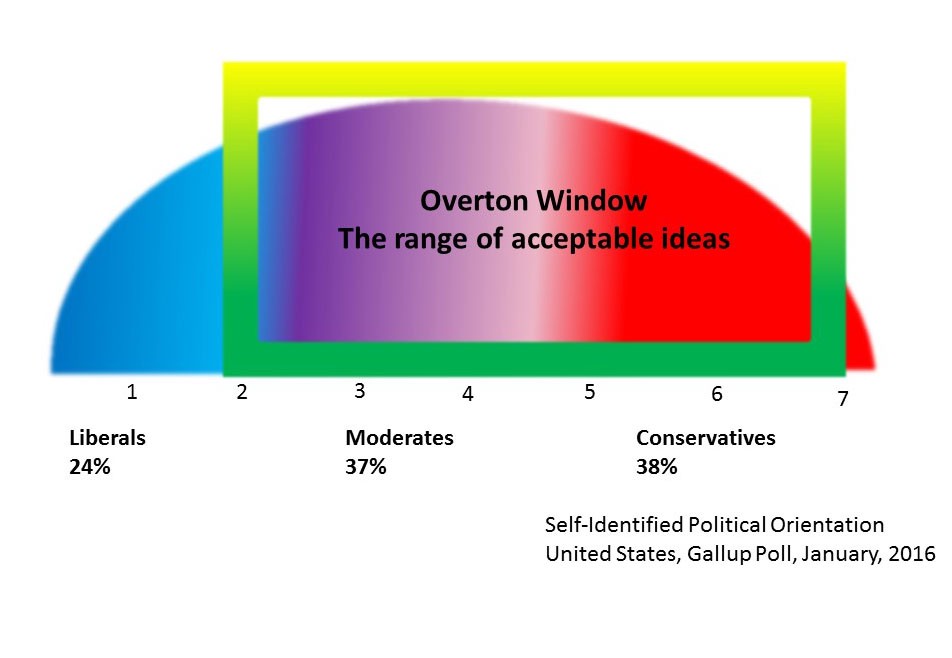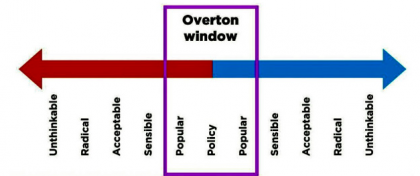 The political right is currently smitten with a concept known as the Overton Window. Named after Joseph P. Overton of the conservative Mackinac Center for Public Policy, the core of the Overton Window is that there are, at any specific time, a particular collection of ideologies, ideas and policies which are acceptable to the general public. This assemblage of legitimacy shifts over time; ideas which were once considered unacceptable can become commonplace.
The political right is currently smitten with a concept known as the Overton Window. Named after Joseph P. Overton of the conservative Mackinac Center for Public Policy, the core of the Overton Window is that there are, at any specific time, a particular collection of ideologies, ideas and policies which are acceptable to the general public. This assemblage of legitimacy shifts over time; ideas which were once considered unacceptable can become commonplace.

The Overton Window was introduced to many on the Right through a Glenn Beck novel of the same name. (A novel in the sense that it was a bounded stack of paper with words scattered across it.) In Beck’s hyperbolic “faction” an evil genius shifts the window and is able to use the government to bring tyranny to the people.
The alt-right is convinced the nation is in the midst of an immense, anti-tyranny, rightward shift in the Overton Window. Conservatives delight in this movement and the centrality of power which they believe generated it. Liberals, who once also rhapsodized about cultural change when it flowed in their direction, waffle between decrying the shift and arguing for its emulation.
The current composition of the Window will not be altered by a call for structural change, as “democratic socialists” would hope. Shifts in the Window over time are an effect of strategically linking “new” ideas and policies with America’s “fundamental values.” Significant social, political, and economic transformations can be accepted by the public if they are portrayed as conserving more crucial, underlying tenets of American society.
— Political change is all about coding a redesign of the social fabric as necessary to its preservation.
American “fundamental values” emerged from a murky clutter of principles that were shaped by the uniqueness of our history. The political theorist Louis Hartz claimed that America is “exceptional” in that we avoided the feudalism of Europe. His contention is that we were “born equal” – not empirically, but as a shared historical ethos of individual rights, reason, and rationality which still suffuses our culture.
Hartz called our absolute devotion to the principles that we are all reasoning, rational, “self-owning,” sovereign individuals entitled to “life, liberty and the pursuit of happiness” the “American way of life.” He argued that the New Deal succeeded because Franklin Roosevelt was able to code his “radical” reorganization of government as merely pragmatic, rational, responses to existing circumstances. According to Hartz, “[Roosevelt’s] ‘radicalism’ could consist of ‘bold and persistent experimentation’ which…was perfectly compatible with Americanism…Americanism was gospel…and any conscious transgression of it…was highly unpalatable.”
Progressive politics should not be situating itself outside the consensus of “Americanism,” attempting to lure or propel it towards a socialist utopia. A politics for social change should be positioned squarely inside the consensus of American values, using it is a gravitation core to absorb progressive ideas and reshape the Window from within.
Any incantation of “socialism” by the Left runs counter to the broad American consensus of individualism. A progressive politics should work to reinterpret this consensus rather than attempting to undermine it.
In terms of the current corporate configurations of health care, progressives should argue that the nation is witnessing an abandonment of the historical, fundamental, “Americanist” values of individuality upon which the country was founded. It should be emphasized that we are no longer “self-owning.” Instead we are owned by corporations; reduced to mere digits on a spreadsheet. Our health and our lives discounted to fractions of pennies on the bottom line.
Universal health care should be presented as a rational response to defend the essence of individualism our founding fathers gave us. It shouldn’t be framed as a shift in the current fundamental values, but as a necessary protection against their dissolution. Those pressing for universal health care, and a deeper anti-capitalist agenda, should point to the loss of the individual as a fundamental danger – a looming specter requiring practical, rational “defenses.”
The battle for progress will not be won on the terrain of the visionary. Moving forward depends on morphing the future into the past. In a viable progressive politics, everything new is old again.
–RWG–
Richard W Goldin, Lecturer in Political Science; California State University; thegoldinrule@gmail.com




